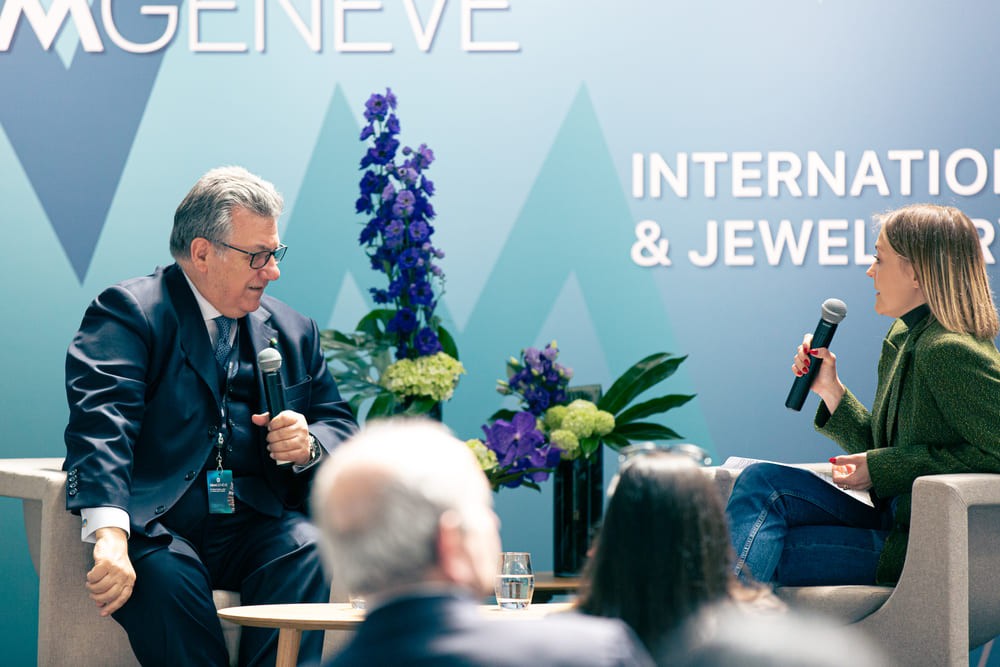Le fermoir en bijouterie, 4000 ans d’histoires
« Sans fermoir, un collier ou un bracelet ça n’existe pas. » La citation est d’Anna Tabakhova et elle résume parfaitement la démarche dans laquelle cette créatrice de bijoux s’est engagée [...]
today12 May 2023
Written by: Claudia Carletti

In this conversation with Andrea Machalova, Gaetano Cavalieri, the President of CIBJO (Confédération Internationale de la Bijouterie, Joaillerie, Orfèvrerie des Diamants, Perles et Pierres), focuses on various aspects of the jewellery industry. CIBJO is a World Confederation representing the interests of national jewellery and gemstone associations, major international corporations, and international representative associations from over 40 countries.
Cavalieri explains that CIBJO’s primary goal is to prioritize consumer confidence in the industry. While CIBJO does not directly engage with consumers, it represents associations and commercial members globally, setting rules and standards through its blue books. These blue books cover different segments of the industry, including diamonds, coloured stones, pearls, coral, precious metals, and gemmology. The aim is to give consumers full disclosure and transparency, ensuring they are well-informed about the origin and components of the jewellery they purchase.
The conversation then delves into the challenges faced by the industry, with a specific focus on traceability, working conditions, and the availability of jewellery pieces in the market. Cavalieri emphasises the importance of responsible sourcing and ensuring that every element in the jewellery supply chain is fully declared and transparent. The blue books CIBJO issued serve as recommendations adopted as national laws in many countries, providing an objective standard for the industry.
Andrea Machalova raises the topic of consumer sensitivity to the provenance of jewellery pieces and whether consumers are interested in knowing where the jewellery comes from. Cavalieri responds that consumer sentiment has evolved over time, and today, consumers are more aware and conscious of the sourcing and origins of the products they purchase. This awareness has been further heightened by recent events, such as the COVID-19 pandemic, influencing consumer behaviour and preferences.
The conversation shifts to discuss the impact of COVID-19 on the industry. Cavalieri shares his experience travelling during the pandemic and witnessing the drastic changes and restrictions implemented worldwide. He explains that the industry had to adapt quickly, and CIBJO organised webinars to help industry professionals navigate the challenges and explore new business models. The shortage of jewellery pieces in the market is acknowledged, and Cavalieri attributes it to the disruptions caused by the pandemic.
Cavalieri also addresses the resilience and proactiveness of the industry in response to COVID-19. He highlights how businesses have become more consumer-centric, striving to provide additional information and make the jewellery industry more appealing and accessible to consumers. He mentions the desire for self-satisfaction and the emotional significance of jewellery, particularly when other pleasures, such as travel or dining out, are restricted.
Andrea Machalova then asks Cavalieri about the biggest challenges the industry faces, to which he responds that CIBJO stays vigilant and alert to global events and political decisions. The organisation’s role includes exercising political leadership, monitoring international relations, and addressing issues like sanctions and human rights concerns. Cavalieri highlights that the individuals working within CIBJO do so voluntarily, driven by their passion for the industry.
The conversation concludes with a discussion on improving traceability, specifically in the gemstone industry, which involves more independent miners and artisans than the diamond industry, dominated by major corporations. Cavalieri explains that CIBJO has engaged in discussions and research with corporations in the diamond industry to address the social and environmental aspects of mining. However, he recognises the need for further efforts in promoting responsible practices and traceability in the gemstone sector.
In conclusion, CIBJO, the World Confederation representing jewellery and gemstone associations, is dedicated to consumer confidence and transparency within the industry. Through their blue books and standards, they aim to inform consumers about the origin and components of jewellery, ensuring full disclosure and transparency throughout the supply chain. The COVID-19 pandemic has presented challenges for the industry, with companies adapting their business models and finding innovative ways to connect with consumers. The industry’s focus on self-satisfaction and providing pleasure to consumers through jewellery has remained strong, even in challenging times. CIBJO acknowledges the importance of political decisions, international relations, and human rights in shaping the industry and remains alert and proactive. Improving traceability is a key goal, particularly in the gemstone industry, where independent miners and artisans play a significant role. While big corporations primarily control the diamond segment, efforts are being made to address working conditions and ensure the well-being of miners. Overall, CIBJO’s mission is to govern the industry properly, fostering love, passion, satisfaction, and emotional connections through the art of jewellery.
Justine Lamarretoday12 May 2023
« Sans fermoir, un collier ou un bracelet ça n’existe pas. » La citation est d’Anna Tabakhova et elle résume parfaitement la démarche dans laquelle cette créatrice de bijoux s’est engagée [...]